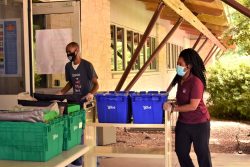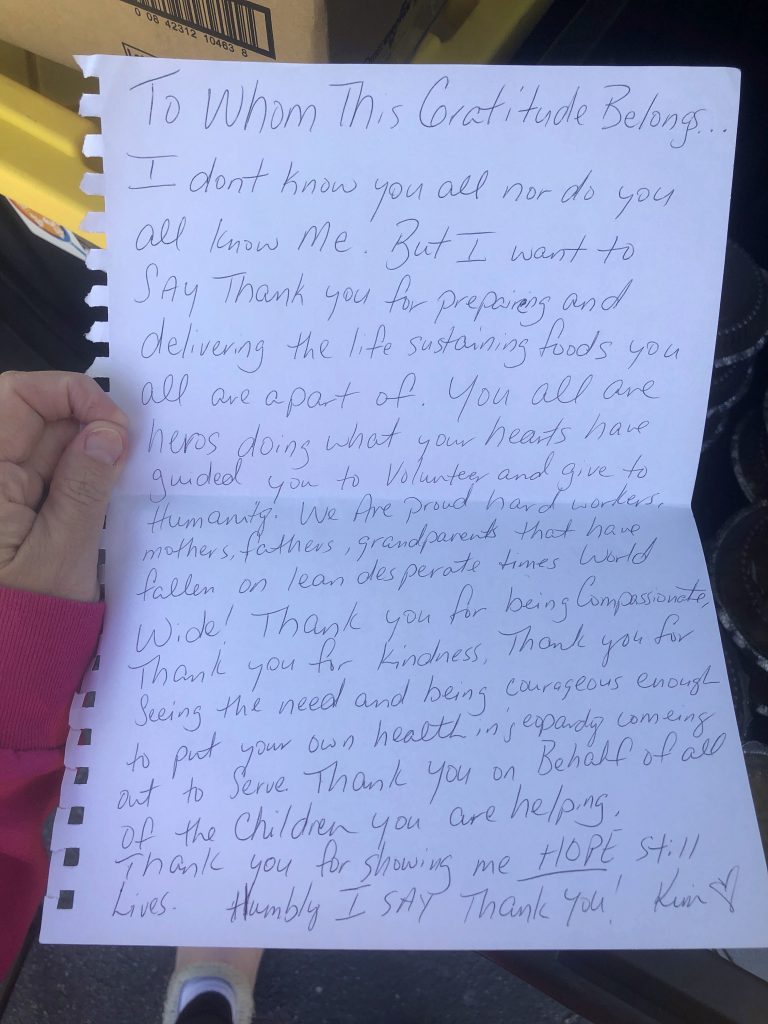
In mid-March, 2020, it became clear that Arkansas schools were going to close before spring break and likely remain closed after spring break due to the COVID-19 pandemic. It was then that Kay Kay DeRosette, the former Be Mighty Coordinator for the Central Arkansas Library System (CALS), met with officials from the City of Little Rock and the Little Rock School District (LRSD). It was clear that child hunger was going to be an immediate challenge that families would face. Many families, especially those with low incomes, count schools for breakfast and lunch, as well as daycares and out-of-school programs during the summer or times when schools were closed normally. The sudden cancellation of classes combined with the closure of the state in general meant many daycares and out-of-school programs were not going to be available to help meet children’s nutritional needs.
Although it may seem like the library system would not be a normal partner in trying to ensure that hungry kids have the food they need, they are actually a natural fit in a number of ways. CALS already runs afterschool and summer programs at a variety of branches throughout Central Arkansas. In addition, dozens of sites provide meals through the Be Mighty Little Rock program, which includes assistance with transportation by providing bus passes and also helps engage children in activities such as reading and exercise programs, cooking classes and games, among others. Furthermore, libraries are located near the communities who most need assistance, making them more accessible for many students, especially for families that rely on school or public transportation.
The Friday of the shutdown, the LRSD took responsibility for the meal program, and CALS began serving meals that Saturday. While it may sound like it was an easy transition, it actually required a lot of work on behalf of CALS, their partners, and the state to apply for and receive waivers due to the pandemic under the various Child Nutrition Programs administered by the U.S. Department of Agriculture (USDA). These included waivers to allow children to take pick-up meals and take them home (prior to the waver, children were required to eat the meals as the site). They also got seamless summer service waivers, allowing sites that were already approved for school year meals to continue to serve the same children during the summer. They also received waivers to expand meal service hours, add weekend mealtimes and allow parents or caregivers to pick up meals for their children, all of which made it easier for children to receive meals.
Prior to the pandemic, there were 10 Be Mighty sites; but when the state shut down, only four library sites were able to serve meals. In March 2020, those sites served an average of 234 children per day. By June 2020, at the height of the pandemic, 10 sites were serving meals regularly, and were serving an average of 550 children per day. Between March 2020 and August 2021, CALS has served more than 200,000 meals. While numbers had been decreasing during the 20/21 school year to a low of 112 daily in January, they began steadily increasing again to a high of 173 per day in July, as the Delta variant caused increasing complications for families.
In addition to making sites available, staff and volunteers were needed to help distribute meals daily. And the libraries didn’t just want to serve meals. They expanded their efforts by offering referrals for other services and providing resources to help with food insecurity. SeRossette took on a new role at CALS in February as grants coordinator, and Jasmine Zandi joined the team as the new Be Mighty specialist in April 2021. During the last summer, they had four AmeriCorps members trained as Supplemental Nutrition Assistance Program (SNAP) navigators to help eligible residents to apply for SNAP benefits. They also fundraised privately so they could help provide meals to the parents, who were many times going hungry even though their children were receiving meals. If there is one thing that CALS believed could be improved upon, it was that the USDA could help bring dignity to the food program by allowing sites to feed both parents and children.
It was important to library staff to make sure they were doing what they could to help families during the pandemic. As DeRosette explained, “We are a community resource, and our mission is to help residents reach their full potential. When kids don’t have enough food, they can’t learn, grow, or thrive. As an institution that supports education and lifelong learning, this was a clear connection to our work.”
Families were appreciative of the work of the staff and volunteers in providing meals locally so they could access the program and ensure that their children could receive meals. Some parents who were picking up meals for their children even volunteered to help distribute meals so they could not only receive assistance but also help others.
 One day, a letter was slipped through the book return slot at the McMath Library and was waiting as workers and volunteers came in to prepare for meal service for the day. It truly brought home the impact CALS was having in supporting their neighbors during the pandemic. The letter, signed only Kim, read:
One day, a letter was slipped through the book return slot at the McMath Library and was waiting as workers and volunteers came in to prepare for meal service for the day. It truly brought home the impact CALS was having in supporting their neighbors during the pandemic. The letter, signed only Kim, read:
To whom this gratitude belongs,
I don’t know you all nor do you all know me. But I want to thank you for preparing and delivering the life sustaining foods you all are a part of. You all are the hero[e]s doing what your hearts have guided you to volunteer and give to humanity. We are hard workers, mothers, fathers, grandparents, that have fallen on lean desperate times World Wide! Thank you for being Compassionate. Thank you for Kindness. Thank you for seeing the need and being courageous enough to put your own health in jeopardy coming out to serve. Thank you on behalf of all the children you are helping. Thank you for showing me HOPE still lives. Humbly I say Thank You!
